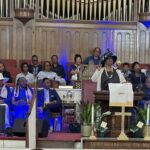By John Thomas III, PhD, Editor
In the African Methodist Episcopal Church, elections are a ubiquitous part of our culture. I remember the first AME election I participated in. I was a candidate for an uncontested area office in the YPD, and my local director gave me two pieces of advice: talk to everyone and bring candy. Since that time, I have participated in numerous elections in various roles, including voter, candidate, presiding officer, and campaign team member.
While I have experienced strong emotional reactions depending on the results, the 2025 Biennial election was different. After the reelection of President Maitkane Abednego Makiti, I found myself in the middle of the 19th Episcopal District delegation cheering, singing, and dancing. Later in the day, a concerned friend approached me about the behavior and the consequences for being so openly boisterous, particularly as a General Officer who would have to undergo reelection.
Having time to reflect, I told my friend that it was the Holy Spirit that led me to the 19th Episcopal District. I truly have no memory of running over to be with the delegation—I just knew I had to go, and then I was there. (And I am not a fast runner, but witnesses told me I bolted like lightning.). I then shared a memory from the 2004 General Conference, the first one I attended. After the first ballot of Bishops, several African delegations began singing because they knew that a Bishop from Districts 14-20 had been elected. One of my seatmates in the 13th District delegation asked, “Why are they making so much noise?” Another delegate rebuked them, responding, “Because they just elected a Bishop for the first time in decades. Let them sing!”
Actions and symbols are important, and the Connectional Lay Organization took two tangible actions that confirmed its presence as the lead auxiliary of our denomination. By reelecting a man from the 19th Episcopal District as its leader and confirming the 2027 Biennial for Johannesburg, South Africa, the CLO demonstrated that the AME Church stands in solidarity with the African Diaspora. In this difficult geopolitical moment when the current American government shows open hostility and disrespect towards African governments and their citizens, the AME Church’s affirmation of the centrality of our witness on the continent speaks loudly.
More specifically, this is a watershed moment in the life of the AME Church in South Africa. Our history in the country has been intertwined with the fight for justice and democracy for all its people. Mother Charlotte Manye Maxeke, the first Black South African woman to receive a college degree, graduated from Wilberforce University and is considered the founder of the African National Congress (ANC) Women’s League. Father MM Mokone, Charlotte’s uncle, approached Bishop Henry M. Turner to co-opt the Ethiopian Church into the AME Church after he left the Wesleyan Methodist Church in South Africa because of its discriminatory practices towards Black ministers and members. The RR Wright Seminary and Wilberforce Community College were two of the most respected institutions of higher education operated by Black people within South Africa until the 1953 Bantu Education Act implemented by the new apartheid regime decimated their structure. Indeed, the apartheid regime prohibited the entry of American bishops into South Africa for years, necessitating the election of Bishop Francis H. Gow in 1956 to superintend the work. The AME Church, as an institution, was one of the major supporters of the first free elections in the Republic of South Africa in 1994, engaging in voter education and training electoral observers.
It is against this historical backdrop that I found myself celebrating with the 19th Episcopal District and the rest of the Lay Organization African Development Initiative (LOADI) Districts (14, 15, 17, and 18). Elections have winners and losers—and I have several dear friends who were unhappy with the election results. However, painted against the larger arc of history and the world we find ourselves in today, the AME Church won.
The CLO made history in 2000 when we advocated for the election of the first female Bishop.
The CLO made history again in 2001 when it elected Wendell Schumann of the 15th Episcopal District to the Executive Board as its first officer from Districts 14 through 20. The CLO made history in 2021 with the election of President Makiti, and the CLO stands again to tell the church that Africa deserves more than a thought, but action.
I invite all members of the Church of Allen to join me in this celebration and dance.






I encountered negative thoughts from members of the 11th Dist Lay because I voted for president Makiti and I was so happy he was reelected. At the 11th Dist Lay convention he attended I expressed my support for him and prayed 🙏 for him to be reelected and God blessed him.